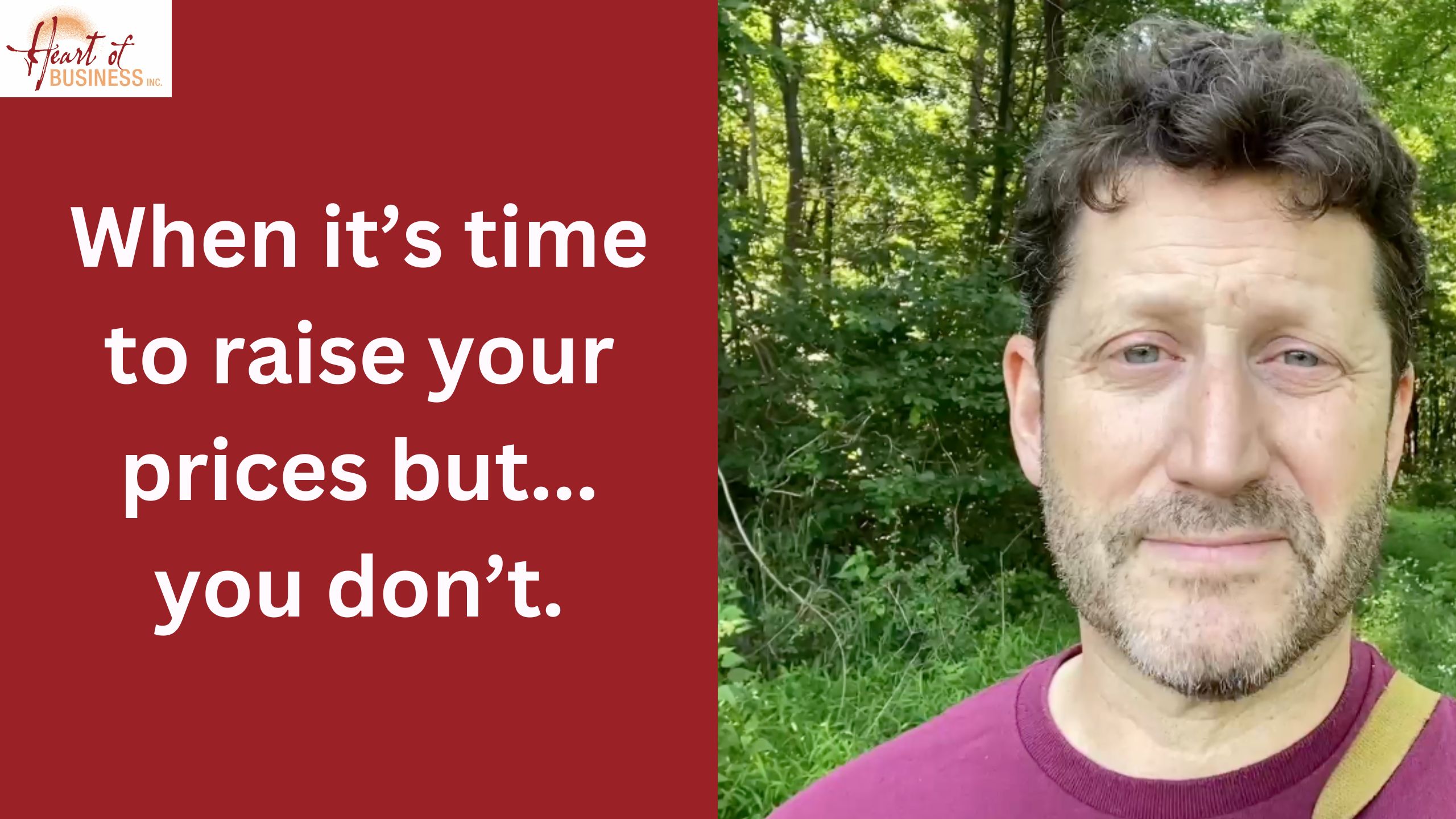 I wrote the article below explaining that if you don’t have a lot of momentum under your business, you shouldn’t go for a traditional publishing contract. One of the reasons I gave is that you don’t get marketing support from the publisher–you have to market yourself anyway.
I wrote the article below explaining that if you don’t have a lot of momentum under your business, you shouldn’t go for a traditional publishing contract. One of the reasons I gave is that you don’t get marketing support from the publisher–you have to market yourself anyway.
Well, Michael Drew over at Push the Key published a post on Your Marketing Platform- No Longer Optional that essential supports what I wrote. I’m not just out there scouring the ‘net for supporting opinions, but he gives some numbers about royalties and costs that explain why publishers are doing what they’re doing. It’s worth a read.
I also felt a little sad reading it. While it’s true I’m a big advocate of all of us small business owners building our own structures and connections with people, so that you don’t have to keep struggling and struggling, it also is the death knell of an era.
It used to be that someone gifted and talented who was a good writer had a shot at making it big. Not a big shot, and knowing marketing increased your chances tremendously.
So many people with a small business dream of writing a book. They dream of getting thousands published and getting them into the hands and hearts of the people who need them.
And, if we’re honest, they are also dreaming about the potential profits that could come from said book.
Let me tell you straight from the heart: if your business doesn’t yet have a great deal of momentum on it, then don’t yet publish a book. Instead, start by creating an information product.
The difference between a book and an information product.
A book is just that: 100-300 pages between a pretty cover. An information product is a more complete package. It may include some audio, a CD or DVD. It may come with a workbook, or other bonuses.
The difference is intention: with an information product, you’re intending to provide a self-study program that walks someone into getting significant results.
Sounds pretty ambitious. Seems like it would be easier to just start with a book. Except for one thing.
A book is another word for struggle.
The publishing industry is set up for everyone to make a living except for the author. The publisher makes a profit, the printer makes a profit, and if you go the traditional route, the agent makes a profit.
And you, as the author, are left with the responsibility of promotion. That means you have to sell your books. The first 50-100 will sell easily to friends and family. After that comes the hard work.
I know authors with email lists of 4000, 5000, 8000 people who are still struggling to sell significant numbers of a $15-$20 book. And even when they do, the profit that comes in to feed their family… well, let’s just say it’s not paying the rent, or even the grocery bill.
You’re a small business owner, not an empire.
I’m not saying you shouldn’t dream of having a growing, thriving business. But, are you really trying to amass an email list of 100,000 people? Are you really trying to reach the mainstream at the level of Oprah?
Actually, come to think of it, I just spoke with someone whose business had been portrayed on the Today Show on prime-time television… and saw absolutely no business results come from that appearance.
I don’t mean to be a downer. It is absolutely possible to build a thriving business. But, when you’re starting out, or if you feel like you’re miles and miles from that arrival point, take my advice: create an information product and not a book.
People want the help.
Your clients will quite happily purchase homestudy programs. And, if you’re selling them for a price that represents their significance, then you don’t have to sell very many of them in a month to be able to take care of the mortgage and the grocery bill.
Plus, as an information product or homestudy program, you still get all the benefits of having a book- the credibility, the access, and the reputation.
The only difference is that you’ll actually be making a living selling these, as opposed to selling a book.
Is there ever a time for a book?
Sure there is. When you’ve sold a significant number of information products, when you have built up a large list of blog readers or email subscribers, when you’re ready to focus on wide-reach marketing, then a fifteen dollar book is going to be an invaluable tool in that process.
But, if you don’t have yet have momentum in your business, then think information product.
Uh, but how much do I really have to put into an info product? Let’s take a look, shall we?
Keys to Creating an Information Product
• Pick a foundational problem that all of your clients deal with.
Start with some common issue that everyone deals with, that if you had your druthers, that every client who came to you would already have worked through some of the basic, foundational something that you picked for your information product.
• Write the (work)book. (huh?)
Yes, start with writing the book. Although it won’t just be a book, written material will form the core of it. And you’ll want to make it a workbook. Meaning that while there will be anecdotes, examples, and narrative, the real meat will be exercises, steps and how-to’s.
You don’t have to write War and Peace. It can be 80-120 pages, but you want it to be really helpful and effective.
• What will help make it really useful?
Illustrations? A video that explains or walks people through it? The recording of a teleclass or live presentation that you gave on the subject?
Include those other pieces, so that people with different strengths in learning, whether audio, visual, or kinesthetic learners, have something to engage with.
By taking the extra effort to create an info product that will help people really get results, you’ll have created something that your clients will love, that you’ll feel proud about, and that will actually bring some healthy profit into your business.
And you can publish your mainstream book later, while riding the momentum that your info product helped to build.
It seems as if the era of the talent scout from the big time publisher looking for the hidden gem is over. (If it ever was that prevalent.) The end of the lottery syndrome.
I think it’s healthier, and more grounded to let go of it. But dreams die hard. Let this dream go, and start working on your info product.
And you may wonder about why and how to create an info product.







16 Responses
Your comments about list size are standing out to me today. I love this article and the advice it shares…
I have clients who want to focus on “book first, then business building” and we always talk about having the marketing structure in place first, and getting that foundation built…
And it’s not just about numbers. Heck, I could easily go out and build a list of 100,000 people. But what I truly want is to be in service.
I want the foundation I build to support me and my business as much as I support it. That way, when I do decide to publish a book, I know it will properly serve, and be in front of people who truly need it.
Jenn Givler
Well, I have lots of opinions here (no surprise), having made my living for most of my life as a writer and then a speaker who is hired because of her books. I think there is still plenty of room for traditionally published books AND the way you frame this is right on.
Jennifer Louden
This is a great article. Thanks to Chris G for posting it on Twitter.
James Fowlkes
I agree with you Mark – the route of the non-fiction book through a traditional publisher is a painful, hair-pulling process that doesn’t usually benefit the author all that much (it’s nice to tell people “such and such published my book” but then try and get them to release the holdback money they keep as reserve against returns).
I’ve never been so joyful as when I’ve been in control of my project. I encourage non-fiction authors to self-publish these days, because I know how long the process is to get published and it will require you to build a marketing plan anyway.
There are lots of authors who make their money through non-traditional routes – think about what groups, businesses, organizations would buy your book in bulk for instance. And definitely all non-fiction authors looking to make a difference should offer follow up training of some kind. Think of the book as the introduction to your material – but how do you apply it?
I feel like I’ve been working backwards all my life. I published early and spent the next ten years figuring out who I was and what I was offering (ironically? I’m a career coach and counsellor).
It’s a good discussion. Painful for those who have dreams of writing a book…but really…this isn’t about not writing a book, it’s seeing WHEN and HOW you write (and publish and market) that book differently.
Thanks Mark.
Karen
I have been traditionally published, and I agree with what you’re saying here Mark.
I love books, and believe there is definitely still a place for them, but what that place is for the small business owner may very well be different than what most owners imagine.
You summed it up for me when you said:
“The publishing industry is set up for everyone to make a living except for the author.”
That has most definitely been my experience. My book was really well received and did well for its niche, but I am certainly not paying my bills with royalty checks.
On a personal level, it was a great experience to have a book traditionally published. Signing the contract was an exciting moment for me. It felt like a huge deal, and, in some ways, it was.
But professionally? It made very little difference. And it certainly wasn’t a meaningful source of income.
I plan to write other books, and when I do they will almost certainly be self-published. After my experience with traditional publishing, I have very little interest in going that route again. Self-publishing just makes more sense for me and where I’m at with my work.
I know my book has been helpful to a lot of people. And there’s a certain level of satisfaction that comes with that knowing.
That said, information products make *so* much more sense to me on every level. A book and a workbook aren’t the same creature. They bring a different level of value to the reader, and also bring a different level of benefit to the author.
Before I even consider writing another book, I will have completed a number of information products. This feels like the best and smartest road for me.
Thanks, as always, for what you’ve shared here. It’s always great to read and so helpful.
Mark- Another brave and wondrous post. Last time I checked, writers warned passionately against self-publishing. Yet the traditional publishing world is not meeting the demands of a global society. Thanks for your affirmation – ‘hey, it’s ok to do it yourself.’ There’s no shame in sharing ideas, however you can do it, so don’t be defeated by the old ways.
Mary H Ruth
@Jenn- Definitely, the list size and foundation are so critical. And, I’m really curious about your statement that you could “easily” go and build a list of 100,000…??
@Jennifer- you’re probably the one person in my life I know who has actually made a really, really good living off of being published. And, it’s interesting that you agree with what is written here. Care to share any of your opinions?
@James- Glad you liked it! And I’m glad Chris G was kind enough to retweet it!
@Karen- It’s so easy to move backwards, isn’t it? I feel the same sometimes. 🙂 And, you make a great point by highlighting that this is for non-fiction writers. Although I would be curious about what it would take for a fiction writer to build a platform and self-publish- if they would do as well or better self-publishing, and selling to their fans in a serialized format…
@Fabeku- Ugh! I can only imagine how much of a letdown that was- after hitting a pinacle of actually signing a contract, seeing *nothing* really come from the result.
I’m glad you’re going to create some info-products. I personally am looking forward to hearing them!
Thank you, thank you, thank you! You have just exploded my guilt over not having written/published “the book” and my fear that I may never do so.
If my desire is to make a contribution (which it mostly is now – I’ve managed to wriggle out of a lot of ego talk), then an info product works just as well, without anywhere near the fuss.
And it’s doable. What a relief to know I can just keep on keepin’ on and be just where I need and want to be!
Lynne Tolk
Great post, Mark! I read somewhere that a book rarely makes money but is very useful for boosting the author’s reputation. It’s great to be able to call yourself a published author in marketing and media. But will that reputation be diminished as self-publishing becomes more popular, and the platforms such as the Kindle starts to promote niche content? Or do these new publishing methods mean that books may become profitable again?
@Mary- Brave AND wondrous? I’m tickled, and touched. (Generally, probably need to be touched in order to be tickled, but we’ll leave that for another post.)
It’s such a shame that as industries get large, that they lose their nimbleness and ability to respond to change. However, I have been spotting some interesting trends- including an article in the latest Fast Company magazine about some alternatives that are emerging out of the publishing world.
Notably, HarperStudio, an imprint of HarperCollins, is experimenting with 50% royalties and some alternative info-product style products. We’ll see what happens.
@Lynne- Yes! Doable! Yes! I’m so glad you can let go of that. It’s a big shift to let go of the big press idea, and to drop into just being of service.
What’s often more effective is being smaller, more humble… that somehow seems to be a faster path to greatness, if that’s where you’re headed. And, if not, it’s much more nourishing.
As for “easily building a list of over 100,000, what I meant was… if I really wanted to, I could build a gigantic list in almost no time – simply by mindlessly following bunches of people on Twitter, friending folks on Facebook, etc.
I prefer to be much more mindful and immerse myself in the community of people who I resonate with, and who in turn, resonate with me 🙂
Jenn Givler
@Ben- I think that a published book does add considerably to an author’s reputation, and if you know how to leverage it, it can a difference in your marketing, especially if you do corporate consulting of some sort.
However, I’m more of a mind of what you are saying- that it’s less important than it used to be, and without a platform, a following, and a business that is prepared to leverage a book, many small business owners will see very little come from having a professionally published book.
@Jenn- Thanks for clearing that up. 🙂 And I’m am whole-heartedly with you.
I got into writing (and publishing) computer how-to books back in the early 1990s. In those days, publishers were hungry for the kinds of books I wrote. I learned very early on that to make a living as a writer, I had to either have a bestseller or write a hell of a lot of books. I wrote a lot of books. I remember the day I received and signed SIX book contracts. A writer’s dream come true, but I NEEDED that many books to make a living that year.
Publishing has changed, however. Publishers are chasing one fad after another. Publisher A has a bestseller and Publishers B through Z scramble to get a copycat book out. Sometimes they’ll publish multiple similar titles just to see what sticks. (Think spaghetti on a wall.) The author with the losing book sinks back into obscurity.
In my industry — computer how-to at the beginner to intermediate level — there’s less of a need for books. Everyone knows how to point, click, drag, select text, choose menu options, etc. Why buy a book explaining how to perform a task in Microsoft Word when a Google search will deliver a dozen articles and blog posts that explain it? My titles are dying simply because they’re not needed. It’s a sad state of affairs for dinosaurs like me.
But it’s not just my industry. Web publishing has put a wealth of information out there. It’s hard to show the value of a book when so much information is available for free.
I believe in the power of self-publishing, but having published a book for another author, I believe print on demand or e-book publishing (or both) is the way to go. There’s nothing worse than having a basement or garage full of unsold books that are losing their value every day — especially when you spent thousands to get that paper printed and delivered.
I also believe that no one should tackle any publishing project without a clear idea of the market and a plan for selling to that market.
I don’t think self-publishing works well for fiction at all. Sure, there are a few folks who have managed to do okay — but look at their marketing efforts. Can YOU do all that?
My point — which I seem to be having trouble making this morning — is that traditional print publishing is dying. It’s difficult for authors and publishers to create a printed book that will sell. Marketing is the key — being able to define and sell to a market is the difference between success and failure.
As for me, I’m building my third career (writing was my second) and shifting my writing efforts to creating video-based products. That’s part of the game: reinventing yourself as needed to be able to deliver what people will buy.
Maria
Hear, hear Maria…you did make several great points. I think flexibility and adaptibility are key…and you have to stay nimble specifically given what your niche market/expertise is.
Mark, one of these days I’ll talk to some agent acquaintences of mine about fiction. I think fiction is a totally different animal, mostly because it’s about cultivating a different kind of following. You need the publishing world to put that stamp of approval on you, and there’s a path to that often (publishing short stories, prizes and awards etc.) that non-fiction doesn’t have.
Non-fiction however has the ability to be nimble (word of the day!) in terms of its form. Could be a book, an audio, a workbook, a blog.
Still, might I add, I love to write non-fiction books – I think in books – and I believe there’s an art to a good non-fiction book. I think my biggest obstacle as a writer has been being good at something (writing engaging non-fiction) in a market where the quality of the writing has mattered less than the usefulness of the pure content, which has mattered even LESS than the “hook” and the marketing angle and the platform. Ai yi yi.
My final thought refers back to Jenn’s point, which is people like Mark and his authentic writing lead me to believe there is a “new” non-fiction possibility rising from the ashes of the faddish traditional publishing route. Write quality, authentic material that engages the readers’ emotions as well as informs. Talk to their Spirit, not just their mind. Publishers don’t understand this distinction, but readers “know it when they read it”. And they always want more.
Thanks for the great discussion everyone, Mark especially!
Karen
One more p.s. – this is from your mention Mark of 50/50 splits.
In my latest publishing venture, I’ve hooked up with a small publisher who is a friend, a person of high integrity and who (happily) publishes in the career book niche (my niche). He’s paid for the publishing, but has given me full control of the material, inside and out. I didn’t get an advance, but I got something better – real accountability and connection to how my book sells.
He does his accounting every 3 months instead of 6 and he’s splits the profits with me 50/50. You can’t believe what a difference that makes – to see your marketing efforts result in a check within a reasonable amount of time (I’ve still got money out there in “reserves” FOUR YEARS after publishing with a traditional publisher and believe me, it makes it hard not to get grumpy about it).
Publishers should get on this bandwagon because all this new deal makes me want to do is let more people know about my book (btw…The Job of Your Life by Karen Schaffer http://thejobofyourlife.wordpress.com/about/about-the-job-of-your-life-by-karen-schaffer/ – …and thanks for the opportunity to shout out my stuff) in a positive way.
This current publishing situation is the best blend I’ve ever experienced of publisher/self-publishing and I’m very grateful for it.
Until other publishers catch up, self-publishing has gotten easier and easier and much less expensive. I agree with Maria that you don’t want a garage filled with unsold books – you need a plan in place to sell them – but if your heart is set on seeing yourself in a book form, it’s possible to do smaller print runs than ever now.
Basically, it’s not so cut and dried as it used to be – which is hard on the one hand because the steps to successful publishing isn’t so clear cut, but amazing on the other hand because you have so much more control and ability to earn a living from it.
Sigh. I have so much passion for seeing people achieve their writing dreams. It really is a great feeling, so I encourage people with that dream to get writing, even if for their own creative satisfaction.
Have a good day all and thanks for listening.
Karen
@Maria- I think you are so right- there is so much that is dying in our culture, and especially in our commerce model, that grief seems to be the order of the day.
And, with the dying, there is an opportunity for some real new births and experimentation. I like the distinction you make between self-publishings, and print-on-demand. I tend to use the terms interchangeably, but they are different.
@Karen- Your new venture sounds terribly exciting! I hope you keep us updated on it. I really like the path many of us are going on. Are you kidding, FOUR YEARS and you haven’t received all the money coming to you? It seems they owe you interest on that…
And I think it’s settled: we’re definitely all against a basement full of unsold books! 🙂 And, it looks like the possibilities are huge for other creative ventures in putting information and content out there.
I’m still curious- I bet it is possible to create an alternate route of publishing fiction. I think back to the 1800’s, where fiction was often published in a serialized format in monthly magazines, before or instead of being published in books. That seems ideal for a blog, to build up a following.
And then, for the author to sell copies of the book directly to the audience, because a book is so much more convenient to read, than a blog on a computer screen.